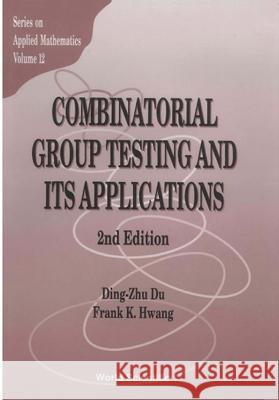Combinatorial Group Testing and Its Applications (2nd Edition) » książka
Combinatorial Group Testing and Its Applications (2nd Edition)
ISBN-13: 9789810241070 / Angielski / Twarda / 1999 / 336 str.
Group testing has been used in medical, chemical and electrical testing, coding, drug screening, pollution control, multiaccess channel management, and recently in data verification, clone library screening and AIDS testing. The mathematical model can be either combinatorial or probabilistic. This book summarizes all important results under the combinatorial model, and demonstrates their applications in real problems. Some other search problems, including the famous counterfeit-coins problem, are also studied in depth.
There are two reasons for publishing a second edition of this book. The first is the usual need to update the text (after six years) and correct errors. The second -- and more important -- reason is to accommodate the recent sudden growth of interest in applying the idea of group testing to clone library screening. This development is much more than just a new application, since the new application brings with it new objectives which require a new twist of theory. It also embraces the growing importance of two topics: nonadaptive algorithms and error tolerance. Two new chapters, one on clone library screening and the other on error tolerance, have been added. Also included is a new chapter on counterfeit coins, the most famous search problem historically, which recently drew on an unexpected connection to some deep mathematical theory to yield new results. Finally, the chapters have been recognized into parts to provide focuses and perspectives.











